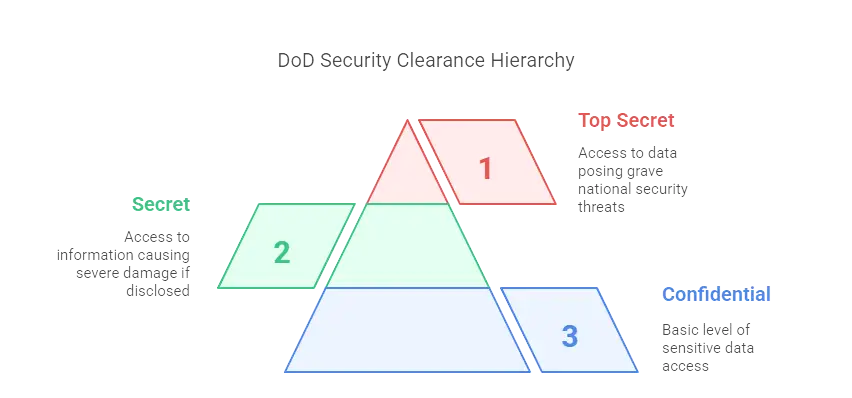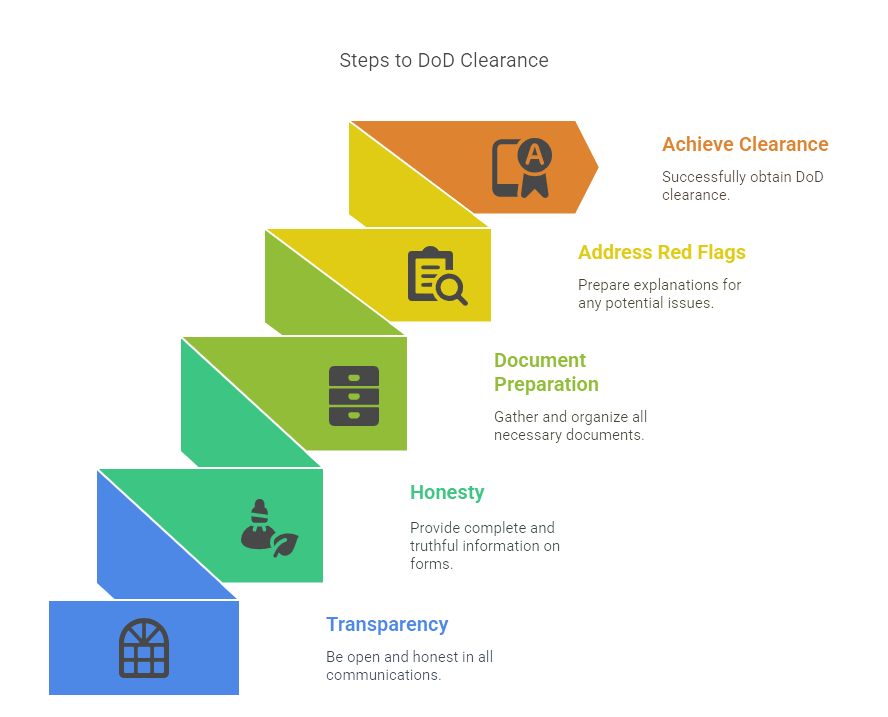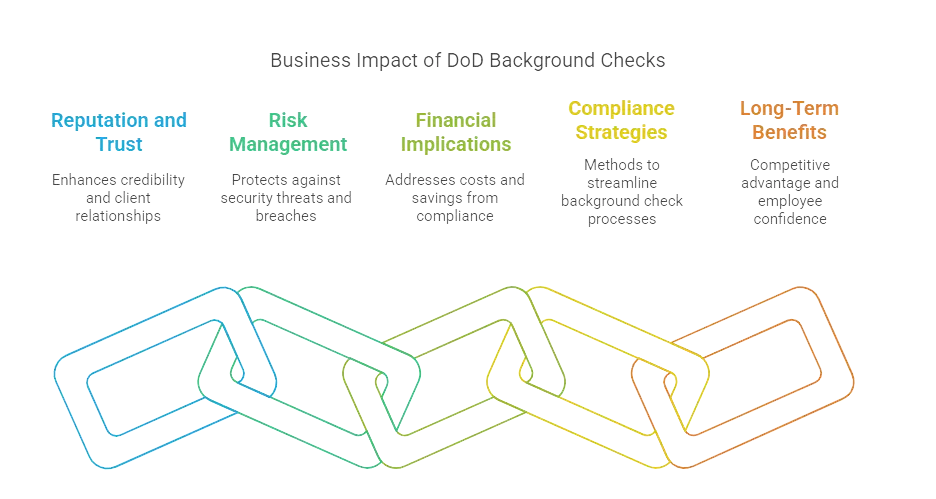Navigating the labyrinth of background checks can be daunting, especially for contractors eyeing projects with the Department of Defense (DoD). The stakes are high; securing DoD clearance isn't just about ticking off boxesâÂÂit's about demonstrating unshakeable reliability and trustworthiness.
Whether you're a seasoned contractor or new to the game, this guide provides comprehensive insights into meeting DoD Contractor Background Check requirements. We'll draw on firsthand experiences, avoid common pitfalls, and ensure you're ready to tackle this stringent yet rewarding process.
Key Takeaways
- Securing a DoD contract involves a meticulous and crucial background check to ensure the reliability and trustworthiness of individuals handling sensitive information.
- The background check process includes different levels of security clearanceâÂÂConfidential, Secret, and Top SecretâÂÂeach providing access to varying degrees of classified information.
- Legal frameworks such as the Federal Information Security Management Act (FISMA) and the National Industrial Security Program Operating Manual (NISPOM) guide background checks.
- The thorough process involves detailed paperwork, comprehensive investigations, and a rigorous adjudication phase to assess potential risks.
- Successful contractors emphasize the importance of honesty, thorough documentation, and maintaining a professional online presence to avoid common pitfalls and secure clearance.
Introduction
Securing a DoD contract is more than just landing a lucrative projectâÂÂitâÂÂs about safeguarding national security. At the heart of this process lies the DoD Contractor Background Check, an essential step to ensure only the most reliable and trustworthy individuals gain access to sensitive information.
This article will walk you through the intricacies of DoD background checks, providing a comprehensive roadmap. WeâÂÂll cover the different levels of security clearance, the legal framework, and the nuts and bolts of the investigation process. By the end, youâÂÂll understand the importance of these checks and how to navigate them effectively, steering clear of common pitfalls and leveraging insights from seasoned contractors.
Understanding the background check process is critical. It can distinguish between a successful contract bid and a missed opportunity. So, letâÂÂs dive in and demystify what it takes to meet DoD Contractor Background Check requirements and set you on a path to success.
Getting that DoD contract? It is more than just technical skill; it also requires honesty and character. The process allows the contractors to demonstrate their integrity, resilience, and commitment to the highest standards of accountability in addition to compliance.
Understanding DoD Contractor Background Checks
What Is a DoD Contractor Background Check?
A DoD Contractor Background Check is a detailed evaluation process designed to verify the trustworthiness and reliability of individuals seeking to work on Defense-related contracts. These checks ensure that only individuals with high integrity and reliability gain access to sensitive information and roles. At its core, the process is about risk management and safeguarding national security.
Levels of Security Clearance: Overview of Different Types
Security clearances come in three primary levels: Confidential, Secret, and Top Secret. Each level grants access to different degrees of classified information. Confidential clearances cover the basic level of sensitive data, whereas Secret clearances provide access to information that could cause severe damage to national security if disclosed. The Top Secret clearance is the highest level, granting access to data that could present grave threats to national security if compromised. For more detailed information on the various levels of security clearances, prospective contractors can visit the USAjobs Help Center.
Legal Framework: Relevant Laws and Regulations
Several laws and regulations structure how background checks for DoD contractors are carried out. The Federal Information Security Management Act (FISMA) sets the broad requirements for protecting and overseeing federal information systems, establishing the need for rigor in background checks. The National Industrial Security Program Operating Manual (NISPOM) provides detailed guidelines for contractors handling classified information. Together, these regulations create a robust framework that ensures all contractors meet strict security and reliability standards.

The DoD Background Check Process
Initial Steps: What to Expect
The journey begins with what might feel like an avalanche of paperwork. The Standard Form 86 (SF-86) is your first hurdle. ItâÂÂs a lengthy document that digs deep into your history, encompassing everything from your education to your financial status. Take your time with it; accuracy is paramount. Missteps here can set you back significantly.
Sponsoring organizations often play a crucial role at this stage. They serve as your guide and advocate, helping you navigate the bureaucracy and ensuring that your preliminary materials are in order. Don't hesitate to lean on them; their experience can be invaluable.
Investigative Procedures: In-depth Examination
Once the paperwork is squared away, the real scrutiny begins. A background investigator will delve into your life story, corroborating the information provided in your SF-86. Expect interviewsâÂÂnot just of you but also of your neighbors, former employers, and acquaintances.
Financial reviews are a key focal point. Your financial stability is paramount, along with your integrity of character. Outstanding debt, bankruptcy, or a history of economic mismanagement can raise red flags.
Be prepared for this to be thorough. Investigators will check records, validate claims, and cross-reference details. The idea is that if youâÂÂre trusted with national security information, there should be no hidden skeletons.
Adjudication: Making the Final Decision
Adjudication is the final filter. All gathered information is evaluated against 13 adjudicative guidelines, ranging from allegiance to the United States to misuse of information technology.
Decisions arenâÂÂt black and white; theyâÂÂre about risk management. The adjudicator asks: Does this person pose a potential risk? If there are concerns, mitigating factors might still tilt things in your favor. Full and voluntary disclosure of past issues can weigh heavily on the positive side.
Once a determination is made, youâÂÂll receive your clearance or a statement explaining why it was denied. There's an appeals process, but naturally, itâÂÂs much easier to get it right the first time. Keep your nose clean, be honest, and stay transparent. Your diligence here can make or break your chances at securing that coveted DoD contract.
Real Insights: Tips from Successful Contractors
Firsthand Experiences: What Worked Best
Navigating the DoD background check isn't a walk in the park, but it's not an insurmountable mountain. Many have walked this path before, and their experiences can illuminate what works. One contractor shared, "I learned early on that transparency is your best friend. Treat the forms like a confessionalâÂÂbetter they hear it from you than find out on their own." Another emphasized the importance of preparation: "Compile every document you think you might needâÂÂthen double it. The process is thorough, and organizing your paperwork will save you many headaches."
Preparing for the Investigation
Honesty is non-negotiable. When filling out the SF-86 or any other form, the key is to be both honest and exhaustive. This isn't the place for half-truths or skipped details. One veteran contractor advised, "If you think something might be minor and not worth mentioning, mention it anyway. The investigators will appreciate your thoroughness, and it builds trust."
Get your documents in order. Start with the basics: birth certificates, social security records, military service documents, and any legal paperwork. It's also wise to address potential red flags upfront. If you've had financial troubles, legal issues, or other past discrepancies, prepare to explain them succinctly and provide evidence of resolution or improvement. One insider noted, "A blemish on your record isn't a denial sentence. It's how you handle and present it that counts."
In short, follow these two principles: transparency and organization. By taking these tips to heart, you position yourself strongly in the pursuit of DoD clearance.

Common Pitfalls and How to Avoid Them
Inconsistencies in Information
The devil is in the details when filling out forms for a DoD contractor background check. Tiny discrepancies can raise red flags and derail your application. Whether it's your employment history or residential address, ensure that all provided information is accurate and consistent across every form. Double-check dates, contact details, and spelling to avoid unnecessary complications. A consistent narrative builds trust and demonstrates reliability.
Undisclosed Financial Issues
Financial stability is more than just a numberâÂÂitâÂÂs a metric for trustworthiness. Any undisclosed debt, bankruptcy, or credit issue can tarnish your application. Be upfront about your financial history. If you've had difficulties, provide context and show steps taken to resolve them. Proactive disclosure paired with evidence of responsible management can mitigate concerns and demonstrate integrity.
Social Media Scrutiny
Your online presence is fair game in a background investigation. A single inappropriate post or questionable connection can jeopardize your clearance. Scrub your social media profiles of any posts, photos, or comments that could be interpreted negatively. Adjust your privacy settings to make sure you control what is visible. Maintaining a professional online persona is crucial for passing the social media scrutiny phase of the background check.
Avoid these pitfalls by being thorough, honest, and proactive. Each step toward transparency and diligence brings you closer to securing that coveted DoD clearance.
Maintaining Your Security Clearance
Ongoing Requirements: Keeping Your Clearance
Don't think the hard part is over once you've jumped through the hoops and secured your DoD clearance. The key to maintaining your clearance lies in staying on the ball with periodic reinvestigations and continuous evaluations. These routine checks ensure that you still meet the stringent standards required by the DoD. It's a good idea to mark your calendar for these reinvestigations and keep diligent records to make this process as smooth as possible.
Reporting Changes: What to Communicate
Life happens, and the DoD needs to know about significant changes in your life that might affect your security clearance. Got a new job? Moving to a different address? Or maybe thereâÂÂs been a major change in your financial situation? Make sure to report these changes promptly. Keeping the DoD in the loop about your circumstances helps demonstrate your ongoing integrity and reliabilityâÂÂa cornerstone of your continued clearance status.
Security Protocols: Adhering to DoD Standards
Securing a clearance isnâÂÂt a one-and-done deal; maintaining it means adhering strictly to DoD protocols. This includes everything from handling classified documents appropriately to following cybersecurity practices. The DoD doesnâÂÂt take these protocols lightly, and neither should you. Consistency in following these rules protects national security and ensures that your clearance remains intact.
Understanding the Business Impact of DoD Contractor Background Check Requirements
Why Background Checks Matter to Your Business
Reputation and Trust: Maintaining a solid reputation is crucial for any business working with the Department of Defense (DoD). Adhering to the DoD's strict background check requirements ensures compliance and positions your company as a trustworthy and reliable partner. This trust can increase opportunities and strengthen relationships with government and private sector clients who value security and reliability.
Risk Management: Comprehensive background checks protect your business from potential risks. By thoroughly vetting your employees, you reduce the chances of hiring individuals who could compromise sensitive information or pose security threats. This proactive approach helps safeguard your business against costly breaches, legal issues, and damage to your companyâÂÂs reputation.
Financial Implications
Cost of Non-Compliance: Non-compliance with DoD background check requirements can have severe financial consequences. These include hefty fines, the potential loss of lucrative contracts, and even disqualification from future opportunities with the DoD. Understanding these risks is essential for business owners to make informed decisions about investing in compliance measures.
Investment in Compliance: While ensuring compliance with DoD requirements might involve upfront costsâÂÂsuch as implementing thorough background check processes or investing in specialized softwareâÂÂthe long-term savings and protection it offers far outweigh these expenses. Proper compliance can prevent the financial fallout from legal disputes, contract losses, and reputation damage, making it a sound investment for your business.
Strategies for Streamlining Compliance
Utilize Compliance Software: To efficiently manage the complexities of DoD background check requirements, consider investing in compliance management software. These tools can automate and streamline the background check process, reducing your team's administrative burden and ensuring that all checks are conducted accurately and promptly.
Outsourcing to Specialists: Partnering with a background check service provider specializing in DoD compliance can be a strategic move. These experts understand the nuances of DoD requirements and can help ensure your business meets all necessary standards, allowing you to focus on other critical aspects of your operations.
Long-Term Business Benefits
Competitive Advantage: Companies that consistently meet or exceed DoD contractor background check requirements gain a competitive edge. By demonstrating your commitment to security and compliance, you position your business as a leader in the industry, increasing your chances of securing high-profile contracts and standing out from competitors.
Employee Confidence: Adhering to strict background check protocols protects your business and boosts employee confidence. When your workforce knows they are part of a secure, compliant organization, it fosters a sense of pride and stability, leading to higher morale and productivity.

Frequently Asked Questions
How long does a DoD Contractor Background Check take?
The duration of a DoD Contractor Background Check can vary widely. On average, you might expect the process to take anywhere from a few months to over a year, depending on the level of clearance required and the complexity of your background. For instance, while a Confidential clearance often takes less time, a Top Secret clearance might involve more extensive investigations, thereby lengthening the process. Factors such as backlog and the thoroughness of your initial paperwork can also impact timing.
What happens if I fail the background check?
Failing a background check doesn't necessarily mean the end of the line for your contract ambitions. If issues arise, the adjudicating body will provide a Statement of Reasons (SOR) outlining their concerns. You then have the opportunity to respond and provide additional context or evidence to address these concerns. It's not uncommon to appeal a denial, and there are established processes in place for reconsideration.
Can I appeal a denied security clearance?
Absolutely. If your security clearance is denied, you have the right to appeal. The first step usually involves submitting a written rebuttal to the concerns outlined in the SOR. If this initial appeal is unsuccessful, you can request a hearing before an administrative judge. It's wise to consult with a security clearance attorney during this process to bolster your chances of a favorable outcome.
Are there any costs associated with obtaining my clearance?
Direct costs for the background check itself are typically borne by the sponsoring agency or organization. However, potential contractors should be aware of indirect costs, such as legal fees if you choose to hire an attorney to assist with the process, or expenses related to gathering and submitting additional documentation. Understanding these ancillary costs can help you budget appropriately and avoid surprises.
Conclusion
Summarizing the key points, navigating the DoD Contractor Background Check process demands a meticulous blend of preparation, transparency, and adherence to set protocols. We've covered the essential initial steps, the intensive investigative procedures, and the critical adjudication phase. Drawing from firsthand experiences, the tips shared emphasize the value of honesty and thoroughness, as well as the importance of organizing relevant documents and preemptively addressing potential red flags.
Proactive preparation cannot be overstated. By approaching the background check process methodically and with due diligence, contractors can bolster their chances of securing the highly coveted DoD clearance. Remember, accuracy in information, transparency about financial and personal history, and maintaining a clean social media presence can make all the difference in passing these stringent checks.
Looking forward, obtaining DoD clearance not only opens doors to a world of prestigious projects but also signifies a trusted reputation in the defense contracting community. Your proactive efforts today pave the way for rewarding opportunities in the future.

GCheck Editorial Team
Meet the GCheck Editorial Team, your trusted source for insightful and up-to-date information in the world of employment background checks. Committed to delivering the latest trends, best practices, and industry insights, our team is dedicated to keeping you informed.
With a passion for ensuring accuracy, compliance, and efficiency in background screening, we are your go-to experts in the field. Stay tuned for our comprehensive articles, guides, and analysis, designed to empower businesses and individuals with the knowledge they need to make informed decisions.
At GCheck, we're here to guide you through the complexities of background checks, every step of the way.





